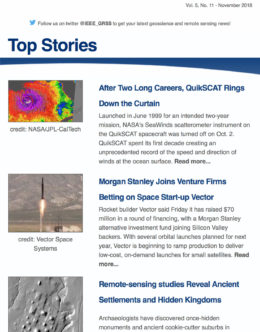Reflectance-Based, Imaging Spectrometer Error Budget Training Course
15-17 July 2016
The Chinese Academy of Sciences, Beijing, China
Sponsored by the IEEE Geoscience and Remote Society, The Geoscience Spaceborne Imaging Spectroscopy Technical Committee
The goal of the training activity is to:
- Teach the basic procedures and methods of the reflectance-based calibration method for use with imaging spectrometry, and
- Describe how those concepts translate into an error budget , both for understanding the repeatability, as well as the absolute uncertainty.
The duration of the course is three days, beginning with an introduction to the terminology and techniques of imaging spectroscopy calibration (both laboratory-based and in-flight) and an overview of the Reflectance-Based Method. Discussions on atmospheric and surface measurements will be provided as well as an overview of atmospheric radiative transfer. Each section includes a discussion of the tools used, their related uncertainties, and the impact on the reflectance-based results.
The training includes a practical session using real world examples for the selection of vicarious calibration sites as a means to demonstrate the application of the concepts and to foster participant discussion within the course.
A course overview is given below, with each numbered unit constituting approximately 20 minutes of class time. This course is sponsored by the IEEE GRSS as part of the Geoscience Imaging Spectroscopy Technical Committee’s Calibration And Validation Initiative. A requirement of the course is that participants have some previous experience and/or formal background in optical remote sensing. Preference will be given to early career scientists and people associated and/or are working in spaceborne imaging spectroscopy teams.
Agenda
Introduction to the Short Course
mp4 Cindy Ong, GSIS Chair and Course Organizer
Introduction to calibration
- Overview – Course Organization: Kurt Thome, NASA/Goddard Space Flight Center pdf, mp4
- General terminology: Kurt Thome, NASA/Goddard Space Flight Centerpdf, mp4
- Calibration concepts, Chris MacLellan, University of Edinburgh pdf, mp4
- Pre-launch characterization and calibration methodologies, pdf
- In-flight characterization and calibration methodologies, pdf, mp4
Reflectance-based method overview
- Basic approach, pdf, mp4
- Results from a selection of vicarious calibration sites, pdf, mp4
- Site location, pdf, mp4
- TOA Radiance/reflectance determination, pdf, mp4
- Uncertainty sources (solar, geolocation) , pdf, mp4
- Error budget , pdf, mp4
Conversion of sensor DN to spectral radiance to spectral reflectance
pdf, mp4
Reflectance-based method – The atmosphere
- Concepts and approaches, pdf
- Equipment and reference standards, pdf
- Measurement approaches, pdf, mp4
- Example results, pdf, mp4
- Uncertainty sources, pdf, mp4
- Reflectance-based error budget discussion, pdf, mp4
end of day1
Reflectance-based method – The surface
- Concepts and approaches pdf, mp4
- Equipment and reference standards, pdf, mp4
- Measurement approaches, pdf, mp4
- Example results, pdf, mp4
- Uncertainty sources, pdf, mp4
- Reflectance-based error budget discussion, pdf, mp4
- Atmospheric correction for Airborne hypoerspectral data: Martin Bachmann, DLR.pdf, mp4
- atcor4_manual.pdf
- Uncertainties pdf, mp4
Reflectance-based method – Radiative transfer, Martin Bachmann, DLR
pdf
Sensitivity analyses
- Input variability, pdf
- Atmosphere-surface coupling, pdf, mp4
- Site-related dependencies, pdf, mp4
- Example results, pdf, mp4
Error budget
- Traceability, pdf, mp4
- Repeatability versus accuracy, pdf, mp4
- Conversion of sensitivity analysis to an error budget, pdf, mp4
- Largest uncertainties for reflectance-based method, pdf
- Uncertainty Estimation pdf, mp4
end of day2
Site selection
- Examples of current sites and how they were selected, pdf, mp4
- Natural versus man-made, pdf, mp4
- Key parameters, pdf, mp4
- Accuracy, uncertainties and traceability, pdf, mp4
Vicarious Calibration Site selection – session 1
pdf, mp4
- Overview and specifications of imaging spectroscopy sensors to be
launched In the next 5 years, - Need for new sites,
- Prospective sites,
- Student practicum,
Site selection practical session
Windows software for viewing spectrograms:
ViewSpecPro_6_0_11_Setup.exe, Manual
Vicarious Calibration Site selection – session 2
- Presentation of class site selection results from practical session
- Discussion of student results
- The team’s current choice, pdf, mp4
Conclusions and wrap up























